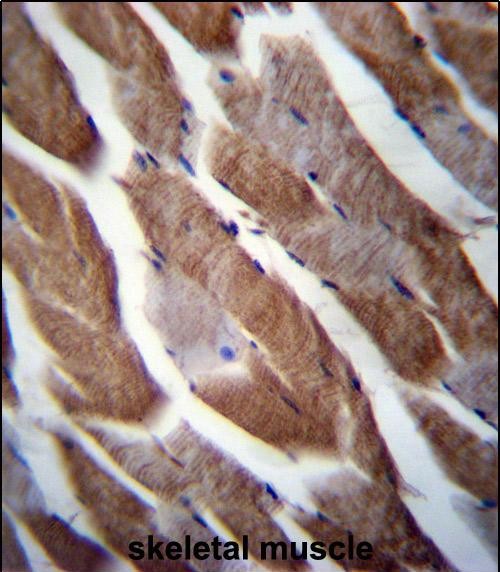MATN1 Antibody (C-term)
Affinity Purified Rabbit Polyclonal Antibody (Pab)
- SPECIFICATION
- CITATIONS
- PROTOCOLS
- BACKGROUND

Application
| IHC-P, WB, E |
|---|---|
| Primary Accession | P21941 |
| Other Accession | NP_002370.1 |
| Reactivity | Human |
| Host | Rabbit |
| Clonality | Polyclonal |
| Isotype | Rabbit IgG |
| Calculated MW | 53701 Da |
| Antigen Region | 376-405 aa |
| Gene ID | 4146 |
|---|---|
| Other Names | Cartilage matrix protein, Matrilin-1, MATN1, CMP, CRTM |
| Target/Specificity | This MATN1 antibody is generated from rabbits immunized with a KLH conjugated synthetic peptide between 376-405 amino acids from the C-terminal region of human MATN1. |
| Dilution | WB~~1:1000 IHC-P~~1:10~50 |
| Format | Purified polyclonal antibody supplied in PBS with 0.09% (W/V) sodium azide. This antibody is purified through a protein A column, followed by peptide affinity purification. |
| Storage | Maintain refrigerated at 2-8°C for up to 2 weeks. For long term storage store at -20°C in small aliquots to prevent freeze-thaw cycles. |
| Precautions | MATN1 Antibody (C-term) is for research use only and not for use in diagnostic or therapeutic procedures. |
| Name | MATN1 |
|---|---|
| Synonyms | CMP, CRTM |
| Function | Cartilage matrix protein is a major component of the extracellular matrix of non-articular cartilage. It binds to collagen. |
| Cellular Location | Secreted, extracellular space, extracellular matrix |

Thousands of laboratories across the world have published research that depended on the performance of antibodies from Abcepta to advance their research. Check out links to articles that cite our products in major peer-reviewed journals, organized by research category.
info@abcepta.com, and receive a free "I Love Antibodies" mug.
Provided below are standard protocols that you may find useful for product applications.
Background
This gene encodes a member of von Willebrand factor A domain containing protein family. This family of proteins are thought to be involved in the formation of filamentous networks in the extracellular matrices of various tissues. Mutations of this gene have been associated with variety of inherited chondrodysplasias.
References
Jang, J.Y., et al. J. Dent. Res. 89(11):1203-1207(2010)
Fresquet, M., et al. J. Biol. Chem. 285(44):34048-34061(2010)
Wheeler, H.E., et al. PLoS Genet. 5 (10), E1000685 (2009) :
Chen, Z.J., et al. Zhonghua Wai Ke Za Zhi 47(17):1332-1335(2009)
Caporaso, N., et al. PLoS ONE 4 (2), E4653 (2009) :
If you have used an Abcepta product and would like to share how it has performed, please click on the "Submit Review" button and provide the requested information. Our staff will examine and post your review and contact you if needed.
If you have any additional inquiries please email technical services at tech@abcepta.com.














 Foundational characteristics of cancer include proliferation, angiogenesis, migration, evasion of apoptosis, and cellular immortality. Find key markers for these cellular processes and antibodies to detect them.
Foundational characteristics of cancer include proliferation, angiogenesis, migration, evasion of apoptosis, and cellular immortality. Find key markers for these cellular processes and antibodies to detect them. The SUMOplot™ Analysis Program predicts and scores sumoylation sites in your protein. SUMOylation is a post-translational modification involved in various cellular processes, such as nuclear-cytosolic transport, transcriptional regulation, apoptosis, protein stability, response to stress, and progression through the cell cycle.
The SUMOplot™ Analysis Program predicts and scores sumoylation sites in your protein. SUMOylation is a post-translational modification involved in various cellular processes, such as nuclear-cytosolic transport, transcriptional regulation, apoptosis, protein stability, response to stress, and progression through the cell cycle. The Autophagy Receptor Motif Plotter predicts and scores autophagy receptor binding sites in your protein. Identifying proteins connected to this pathway is critical to understanding the role of autophagy in physiological as well as pathological processes such as development, differentiation, neurodegenerative diseases, stress, infection, and cancer.
The Autophagy Receptor Motif Plotter predicts and scores autophagy receptor binding sites in your protein. Identifying proteins connected to this pathway is critical to understanding the role of autophagy in physiological as well as pathological processes such as development, differentiation, neurodegenerative diseases, stress, infection, and cancer.



